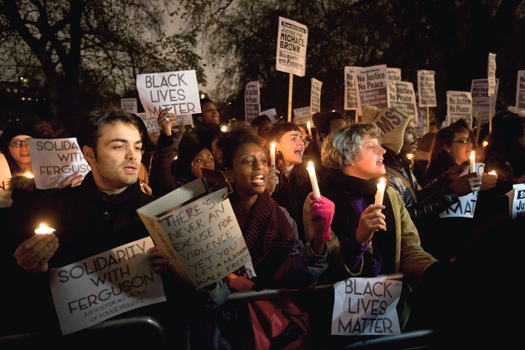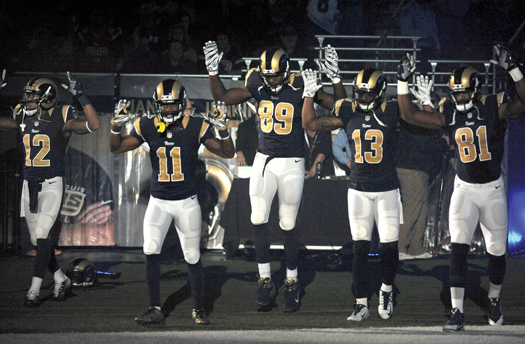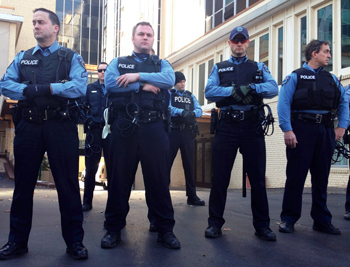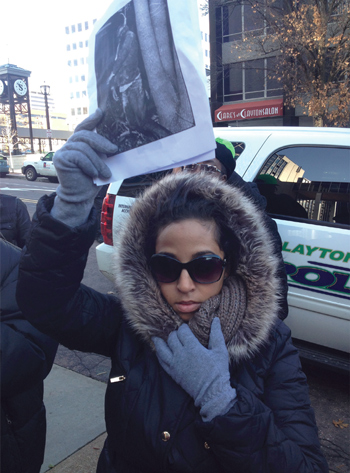By Charlene Muhammad CHARLENEM

(FinalCall.com) – Violence would erupt in the city of Ferguson should a St. Louis County, Mo., grand jury fail to indict White officer Darren Wilson for shooting unarmed Black youth Michael Brown, Jr., warned Nation of Islam Minister Louis Farrakhan shortly before the panel decided the Ferguson, Mo., police officer would face no charges.
The level of oppression and the level of Black frustration and anger will boil over, if justice is not done, the Minister warned during a message delivered on the campus of Morgan State University in Baltimore.
The grand jury decision brought unrest to Ferguson, acts of protests, and solidarity from around the globe as the cry for justice reverberated across America and across several continents.
The acts of support included St. Louis Rams players raising their hands above their heads Nov. 30 at the start of an NFL home game versus the Oakland Raiders. The players used the “Hands Up, Don’t Shoot” gesture that has become a staple of protests and demands for justice. Despite the anger of the head of the St. Louis police union and calls that the players be punished, the NFL sidestepped any controversy. The league respects the right to free speech, there will be no discipline and the matter is closed, said an NFL spokesman.

According to reports, nearly 200 demonstrations occurred after St. Louis County prosecutor Bob McCulloch announced no charges would be filed.
Youth groups, grassroots coalitions, civil rights, faith-based organizations and ordinary people took to the streets.
“Hands up! Don’t shoot!” “No justice! No peace!” and “Black lives matter!” was chanted from Los Angeles to New York, San Francisco to Washington, D.C., and Nigeria to London.
“Injustice brings its natural response no matter how long it takes. Injustice has to be answered by justice, and justice demands that what a man sows, he must eventually reap,” said Min. Farrakhan in his message at Morgan State.
“You cannot continue to snuff out the lives of the innocent and think that there is no payday for you,” he warned.
Demonstrations over the Black Friday weekend brought protestors to Ferguson, Ground Zero in the struggle, with thousands gathering in front of police department headquarters. There were sporadic clashes with police over the Nov. 28 weekend and arrests were made but protestors were undaunted. National Guardsmen activated by Gov. Jay Nixon were posted outside the police headquarters and others stretched along South Florissant Avenue. On the police parking lot, tucked along dark side streets and stationed along the commercial strip were county police and police from jurisdictions near Ferguson, a St. Louis suburb.

Activists have vowed that response to the grand jury’s verdict will not end with mass protests. Many have outlined plans for federal, state and local reforms to stop police abuse. Others have highlighted how ordinary people can help change policing.
“Go fight ISIS! Go rescue somebody!” shouted “Sister” Yvette Harris of St. Louis as she stood across the street from guardsmen on a chilly Saturday night, holding a protest sign. The middle-aged Black mother of four is with MASK, Mothers Against Senseless Killing, and has been protesting every day. We want justice for all the children murdered by police, she said.
The county prosecutor needs to be arrested for rigging the jury and Gov. Jay Nixon needs to impeached, Ms. Harris added. My heart aches for Lesley McSpadden, who lost her son Michael. Darren Wilson “is a murderer and a killer,” she said angrily. “We want some justice. We mothers just have to stick together for justice. It’s not standing out here for one mother; it’s standing out here for all mothers.”
“You’ve got to protest for change,” said college student Atia Singleton, of East St. Louis. She was on a break from school but came out to protest every day. Change means having rights that people observe, not just rights on paper that don’t mean anything, she said. “I understand that everyone can’t afford to like leave their job and abandon their posts but I feel like at some point you have to decide what side of history you want to be on,” said Ms. Singleton referring to police officer and guardsmen on duty.
These protests have been combined with marches and acts of civil disobedience shutting down freeways, intersections and train transportation in different cities.
Demonstrations at stores and malls made the biggest shopping day of the year difficult.
“That is just the kickoff, not the touchdown. It’s just the beginning,” vowed Dr. Jamal Bryant, pastor of Empowerment Temple AME Church, in announcing a #HandsUpDon’tSpend campaign on Nov. 24.
In Ferguson, Mo., Wal-Mart is the biggest corporation in the city, and caters to the majority Black population, observed activist Cephus “Uncle Bobby” Johnson, who has visited the area numerous times to support the fight for justice and support the family of the young man who was killed.
“By shutting it down when protestors did, (Wal-Mart) lost 40 percent of profit, so it’s our hope that other targets of Wal-Mart are as effective and we around the country can actually do the same thing,” he said.
“When I look at it, I see that the young people across the U.S. are realizing that this is something that they have to address. … The most important thing they talk about is how to keep people involved. You actually see what the revolution will look like,” Mr. Johnson said.
“I think people are excited because of the momentum that’s taking place. People want to do something, and this gives them the luxury of advocacy without the threat of arrest,” said Dr. Bryant of the anti-spending campaign he is leading.

Boycotts called for no shopping on Thanksgiving Day and Black Friday through Cyber Monday Dec. 1. That same day was declared a day to walk out of jobs, schools and businesses.
Patronize Black businesses, open accounts with Black-owned banks and join protests, said organizers of different efforts aimed at one goal–economic pain and public discomfort.
“It sets itself up for those who may have hypertension looking at the news, and seeing all that’s taking place, that I can really sit home and still be a part of it, whether I’m in Waterloo, Iowa, Lexington, Kentucky or whether I’m in Los Angeles,” Dr. Bryant told The Final Call.
In St. Louis, some mall employees were surprised by the racial mix of protestors, Mr. Johnson noted. Other workers smiled, danced, clapped and cheered them on, he added.
“Instead of them chasing us with hoods on, they were running, and all we were saying was no justice no peace,” said Beatrice X, Mr. Johnson’s wife and co-founder of the Love Not Blood Campaign.
“It has to be known that, praise be to Allah, everybody is waking up with Mike Brown, but God did that. And you cannot forget the struggles of the families of 30, 40, 50 years ago, 10 years ago. This is not something that’s overnight, but people have been fighting this for a long, long time,” the Muslim activist told The Final Call.
Dr. Opio Sokoni, a political scientist with the Southern Christian Leadership Conference in Jacksonville, Fla. agreed. A number of factors attribute to the sustained, effective protests people are witnessing as a result of the Ferguson uprising, he said.
First is the Midwest, and particularly Missouri’s history, as a hotspot for racial issues, Dr. Sokoni said.
Then there’s what’s happened to young Black boys in recent years, he added. “You have these young boys that are being killed very openly, and people getting off without even so much as a reprimand, or you have a country that’s divided on children being killed by the police. There should be no divide on that, particularly when you talk about innocent children, like a Trayvon Martin,” Dr. Sokoni said.
New York police officers choking Eric Garner, an unarmed Black man, to death, the killing of Oscar Grant, immortalized by the movie “Fruitvale,” similar deaths and a nasty political season means a kind of civil war, he said. The Garner and Grant deaths were captured on cell phone videos.
Blacks are fed up and Black children are seeing themselves in Mike Brown, Trayvon Martin and Jordan Davis, a Black teen in Florida shot to death over loud music a White driver did not like, and cell phone cameras are being used to push back against patterns of abuse, said Dr. Sokoni.
“People want to stand up to this and say you can’t walk away from children being killed by government and people in this country are justifying it and saying it’s okay,” he added.
The Ferguson National Response Network and Liberation News reported on the anti-war, anti-racism Answer Coalition’s website that 1,000 people gathered in Philadelphia and another 1,000 people converged on New York City’s Union Square on Nov. 24 alone. Major intersections were clogged, moments of silence and sit-downs in Brooklyn at the Barclays Center, the United Nations building in midtown Manhattan and in front of the state building in Harlem were observed.
Protestors in Oakland wearing black and gold #BlackLivesMatter t-shirts shut down BART trains on Nov. 28. In San Francisco, the ANSWER Coalition organized a speak-out in the dramatically gentrifying Mission District.
More than 400 people in New Mexico blocked the San Mateo and Central intersection and marched down six lanes of traffic towards the University of New Mexico. They shut down Central Avenue, a main student and commercial thoroughfare, for three hours.
Despite freezing temperatures and snow in Chicago, hundreds of activists and community members gathered at Chicago Police Headquarters Nov. 24 to demand justice for Michael Brown and to show solidarity with the people of Ferguson.
According to ANSWER Coalition organizers, speakers drew connections between the murder of Michael Brown and the ongoing victimization of Black youth in Chicago and across America.
Black Youth Project 100 is a national volunteer group of organizers, writers, activists, and educators which work to fight the criminalization of Black youth.
“The impact of the protests is not only for mainstream consumption, but the impact of the protest is what it does to people who are out there protesting and marching,” said Jade Hadley-Magnus, West Coast organizing coordinator for Black Youth Project 100, which participated in the Chicago action.
“The people get to see in their neighborhoods and communities, young Black people coming together and mobilizing. … The impact is great because a whole new generation of leaders and writers and educators are being politicized by the deplorable conditions that Black men and women face at the hand of police brutality and other abuses of the state,” Ms. Hadley-Magnus said.
She pointed to charges and social media posts that blamed police, some said with evidence captured on videotape, for fires to police cars and rock throwing to jump start violence.
“That just follows the long legacy of the United States Government interfering with Black liberation. It happened with COINTELPRO with them coming in and breaking up the civil rights movement, the Black Panthers, and it’s happening today still,” she said.
She encouraged people to be vigilant and keep control of their movement.
A spotlight on U.S. atrocities
Internationally the plight of young Black men being gunned down by U.S. police is being uncovered, said Mr. Johnson, co-founder of the Love Not Blood Campaign, which works to end police brutality and support those who lose loved ones to police violence.
His nephew, Oscar Grant, III, was fatally shot in the back in Oakland by a Bay Area Transit District police officer on Jan. 1, 2009, while unarmed and lying on his stomach on a station platform.
“The youth saying ‘no more’ has really caused all eyes to look at the U.S.’s real policy when it comes to dealing with these issues in our community and actually perpetrate the crimes on us, and have been getting away with it for years,” Mr. Johnson told the Final Call.
The pain of Mike Brown’s parents, young Black males and the protestors was felt overseas. (See related story on page 4.)
According to news reports, a group of Nigerians in Port Harcourt, marched in protest. Donning white, black and yellow t-shirts with the Michael Brown’s photo, at one point the group of male protestors marched with their hands up in the signature Hands Up! Don’t Shoot! staple sign of demonstrations. They also held candles at times during the protest.
“You don’t just shoot a Black teenager. He’s harmless and you shoot him because he’s Black. No! That is wrong,” argued one Nigerian demonstrator in a video posted on www.bunibuni.com. “And if today they don’t try to solve this issue, they might begin to make the Blacks in America and other parts of the world to feel that their life is worthless,” he continued.
Some 1,500 demonstrators gathered outside the U.S. Embassy in London waved placards reading “Justice for Michael Brown,” “Solidarity with Ferguson” and “Black Lives Matter.” Protestors also marched past the home of the UK prime minister to Parliament Square and New Scotland Yard, headquarters of the Metropolitan Police.
Moving forward, seeking solutions
Activists have vowed that response to the grand jury’s verdict will not end with mass protests. Many have outlined plans for federal, state and local reforms to stop police abuse. Others have highlighted how ordinary people can help change policing.
The Black Youth Project 100 drafted an “Agenda to Keep Us Safe,” a long-term campaign that calls for an end to the criminalization of Black youth. It calls for increased community oversight, law enforcement accountability and repeal of laws that target young people.
It supports “Mike Brown’s Law,” which would make the federal government require police officers to wear body cameras and ensure footage can’t be tampered with, destroyed or altered.
The St. Louis-based Justice for Mike Brown Leadership Coalition is pushing for Ferguson residents to strongly participate in local elections and other voting to support good political leadership and defend their interests. The coalition plans to develop leadership workshops to help those who want to run for political office.
Community control of police and encouraging people to use cameras and cell phones to document encounters with police is another strategy activists are pursuing. They want to create a national database that will document incidents of police harassment and brutality.
The National Black United Front has created a Ferguson Community Action Plan to help remedy police misconduct.
The plan encourages people to join an organization working toward the self-determination, self-respect and self-defense of Black people, and among other things, to demand that a minimum of 51 percent of municipal police departments live in the cities they patrol.
“This cannot be a blip on the radar. This cannot be something that once again opens the discussion about race. We’ve had this discussion for a long time. It’s about time we actually stand together and say no more killing of our youth. No more stolen lives,” said D’andre Teeter, an organizer with the Bay Area Stop Mass Incarceration Network in Oakland.
“There is room for everyone, but the main thing is for people who are not under the gun themselves, they have to speak out. They have to talk to other people. They have to step out of their comfort zone, whatever that comfort zone has been, people have to step out,” Mr. Teeter said.
(Richard B. Muhammad contributed to this report from Ferguson, Mo.)












